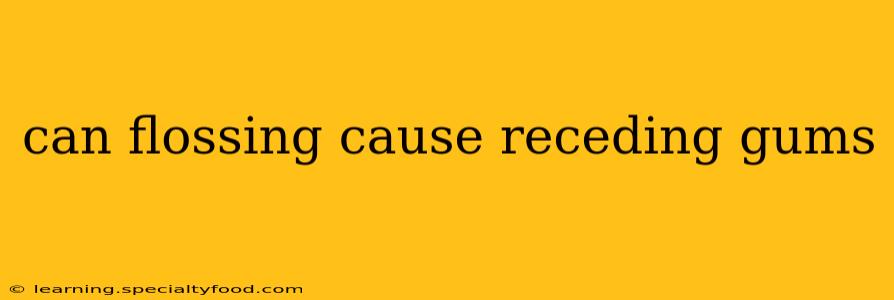Can Flossing Cause Receding Gums? A Comprehensive Look at Gum Health
The question of whether flossing can cause receding gums is a complex one, often debated among dental professionals and patients alike. The short answer is: not directly, but improper flossing techniques can contribute to gum recession. Let's delve into the details.
What is Gum Recession?
Before we address the link between flossing and receding gums, let's define the issue. Gum recession refers to the gradual pulling back of the gums from the teeth, exposing more of the tooth structure, including the roots. This can lead to increased tooth sensitivity, tooth decay, and even tooth loss if left untreated. Several factors contribute to gum recession, including genetics, aggressive brushing, gum disease (periodontitis), and, as we'll explore, improper flossing.
How Can Flossing Contribute to Receding Gums?
Flossing is crucial for maintaining good oral hygiene. It removes plaque and food particles from between teeth where your toothbrush can't reach. However, how you floss is crucial. Aggressive flossing can damage the gum tissue, leading to recession. This damage occurs when the floss is:
- Snapped or Sawed: Instead of gently guiding the floss between teeth, vigorously sawing it back and forth can injure the gums.
- Forced: Trying to force floss between tightly packed teeth or inflamed gums can cause trauma. This is especially true if your gums are already inflamed from gum disease.
- Used with Excessive Pressure: Applying too much force while flossing can damage the delicate gum tissue.
Essentially, it's not the act of flossing itself that causes gum recession, but rather the technique employed. Gentle, careful flossing is beneficial for gum health. Aggressive or improper flossing can contribute to the problem.
What are the Symptoms of Gum Recession?
Recognizing the symptoms of gum recession is essential for early intervention. These symptoms can include:
- Noticeably Longer-Looking Teeth: As the gums recede, more of the tooth becomes visible.
- Sensitive Teeth: Exposed tooth roots are more sensitive to hot, cold, and sweet foods and drinks.
- Bleeding Gums: While some bleeding is normal during flossing, persistent bleeding could indicate gum problems.
- Loose Teeth: Advanced gum recession can lead to tooth loosening.
How Can I Floss Properly to Avoid Gum Recession?
Proper flossing technique is essential for preventing gum damage. Follow these steps:
- Use the Correct Amount of Floss: Use about 18 inches of floss, wrapping most of it around your middle fingers.
- Gently Guide the Floss: Use your thumbs and index fingers to guide the floss gently between your teeth. Avoid snapping or sawing the floss.
- Curve the Floss: Curve the floss around each tooth in a "C" shape and gently slide it up and down the tooth's surface, below the gum line.
- Don't Snap the Floss: Use a smooth, gentle motion, avoiding any harsh movements.
- Use a Fresh Section of Floss: Use a clean section of floss for each tooth.
Are There Alternatives to Flossing?
While flossing remains a cornerstone of oral hygiene, alternatives exist, particularly for individuals struggling with dexterity or gum sensitivity:
- Interdental Brushes: These small brushes can be used to clean between teeth, especially those with wider gaps.
- Water Piks: Water flossers use a pulsating stream of water to remove plaque and food particles.
However, it's important to consult your dentist to determine the best method for your specific needs.
Is it Necessary to Floss Every Day?
Yes, daily flossing is generally recommended for optimal oral hygiene. This is because plaque builds up quickly and can lead to gum disease if left unchecked. Regular flossing helps prevent this buildup and maintain healthy gums.
Can I Stop Flossing if My Gums Are Receding?
No, you should not stop flossing if you have receding gums. However, you might need to adjust your technique to be gentler and seek professional guidance from your dentist or hygienist. They can help determine the cause of your receding gums and recommend the best approach to managing the condition. Continuing to floss properly, even with receding gums, is important for maintaining the health of the remaining gum tissue and preventing further problems.
By understanding the potential link between improper flossing and gum recession, and by adopting proper flossing techniques, you can protect your gum health and maintain a beautiful, healthy smile. Regular dental checkups are crucial for early detection and treatment of any gum issues.
